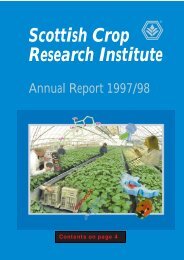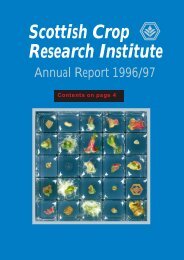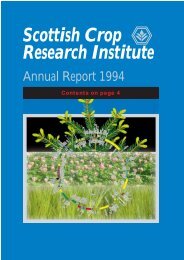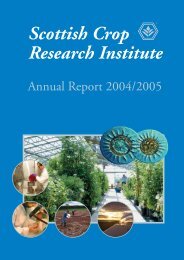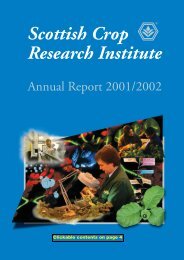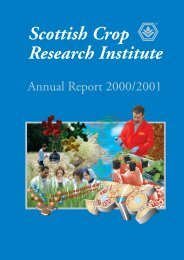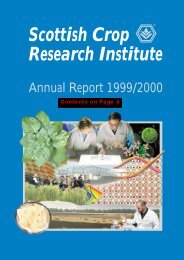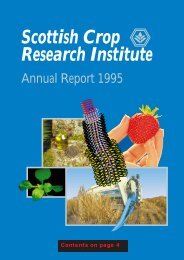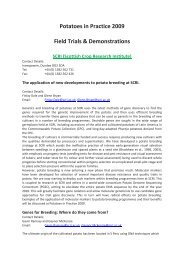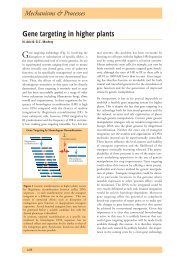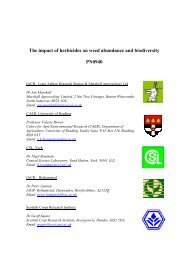PDF file: Annual Report 2002/2003 - Scottish Crop Research Institute
PDF file: Annual Report 2002/2003 - Scottish Crop Research Institute
PDF file: Annual Report 2002/2003 - Scottish Crop Research Institute
You also want an ePaper? Increase the reach of your titles
YUMPU automatically turns print PDFs into web optimized ePapers that Google loves.
Director’s <strong>Report</strong><br />
regions of the UK, with low business investments, high<br />
business rates, low numbers of business start-ups, high<br />
water charges, poor revenue-generating patents and<br />
licences per capita, depopulation and an aging population,<br />
more than half the economy in the public sector,<br />
and profound public-sector mistrust of the private sector.<br />
(see also Populations and Conflicts)<br />
OECD Scoreboard The biennial OECD science, technology,<br />
and industry Scoreboard revealed in <strong>2003</strong> the<br />
transformation of the Chinese economy. Using data in<br />
terms of purchasing power parity, total R&D spending<br />
in China in 2001 was estimated at $60 billion, behind<br />
that of Japan ($104 billion), and the USA ($282 billion).<br />
Around 60% of the R&D spend in China was<br />
from the private sector. Across the OECD membership,<br />
R&D spending as a percentage of total output in<br />
2001 was 2.3%, a figure exceeded by Sweden (4.3%),<br />
and the USA (2.8%); in China it was 1.1%, but its<br />
annual rate of growth, adjusted for inflation, in recent<br />
years has been 10-15%. Eurostat, the statistical service<br />
of the European Commission add weight to OECD<br />
reports, noting that EU member states allocated 1.99%<br />
of their GDP to R&D in <strong>2002</strong>, compared with 3.11%<br />
in Iceland, 2.98% in Japan, and 2.8% in the USA.<br />
Member states above the EU average were Belgium<br />
(2.17%), Denmark (2.4%), Finland (3.49%), France<br />
(2.2%), Germany (2.49%), and Sweden (4.27%).<br />
Member states at or below the average were Austria<br />
(1.94%), Greece (0.67%), the Republic of Ireland<br />
(1.17%), Italy (1.07%), Luxembourg (1.71%), The<br />
Netherlands (1.94%), Portugal (0.84%), Spain<br />
(0.96%), and the UK (1.84%). It was estimated that<br />
in <strong>2002</strong>, €182 billion were spent on R&D in the EU.<br />
Computing While the computer technology industry<br />
suffered from stock-market downgrades and largescale<br />
redundancies, the technology itself experienced<br />
another dynamic year. Web sites, individuals,<br />
Internet service providers, and groups that operated<br />
high-speed networks exercised the music-recording<br />
industry that grew increasingly perplexed about unauthorised<br />
free music distributed over the Internet.<br />
Progress in the adoption of broadband Internet access<br />
was disappointing, with the majority of users dependent<br />
on the slower and lower capacity dial-up Internet<br />
access. Likewise, the adoption of computer applications<br />
available over the Internet was slower than projected.<br />
Internet access varied across several countries, such<br />
that the UN expressed concern about the disadvantage<br />
conferred by not having on-line access – the so-called<br />
‘digital divide’. According to the UN International<br />
Telecommunications Union (ITU), more than 80<br />
countries had fewer than 10 telephone lines for every<br />
100 inhabitants, and in 60% of countries, fewer than<br />
1% of citizens used the Internet. Furthermore, in its<br />
Digital Access Index <strong>2002</strong>, the ITU noted that accessibility<br />
to information and communication technology<br />
in 178 countries was not dominated by the<br />
English-speaking countries. The top 12 in the ranking,<br />
where a score of 1 represents universal access and<br />
use, were Sweden (0.85); Denmark (0.83); Iceland<br />
and South Korea (0.82); Norway, the Netherlands,<br />
Hong Kong, Finland, and Taiwan (0.79); Canada and<br />
the USA (0.78); and the UK (0.77). In <strong>2002</strong>, according<br />
to the OECD, websites per 1,000 people reached<br />
84.7 for Germany, 71.7 for Denmark, and 66.4 for<br />
Norway. Both the UK and USA had more than 60<br />
sites. The OECD average was 30, and the EU average<br />
39.<br />
University and college students throughout the world<br />
were major Internet users to the point that conventional<br />
libraries were becoming neglected. Plagiarism<br />
was facilitated by accessing the Internet, particularly<br />
sites that sold essays, theses, and reports, although the<br />
existence and deployment of web-plagiarism checkers<br />
or verifiers were thought to have restrained the level of<br />
examination cheating, as much as the variable quality<br />
of the material for sale. Other types of cheating,<br />
including unauthorised use of computers to access<br />
examination questions, faking credentials and certificates,<br />
and modifying marking records, merited a new<br />
type of vigilance by examination authorities and<br />
employers.<br />
Dramatic increases were noted in the onslaught of<br />
infuriating unsolicited commercial e-mail - spam. As<br />
a highly cost-efficient method of distributing advertising,<br />
often anonymously, the spam perpetrators patently<br />
included hackers, distributors of worms and viruses,<br />
and pornographers. Internet marketing was also<br />
dogged by issues of privacy, notably those companies<br />
that without gaining customer authorisation placed<br />
‘cookie’ <strong>file</strong>s on consumers’ computers to track Web<br />
surfing. Some areas of marketing did not grow as fast<br />
as anticipated e.g. on-line education, digital subscriptions<br />
to newspapers, magazines, and scientific journals.<br />
Computer security exercised governments in <strong>2002</strong>.<br />
The vulnerability of Internet servers, notably the 13<br />
that handle the Domain Name System, was tested by<br />
terrorists, foreign governments, or hackers, but with-<br />
23



